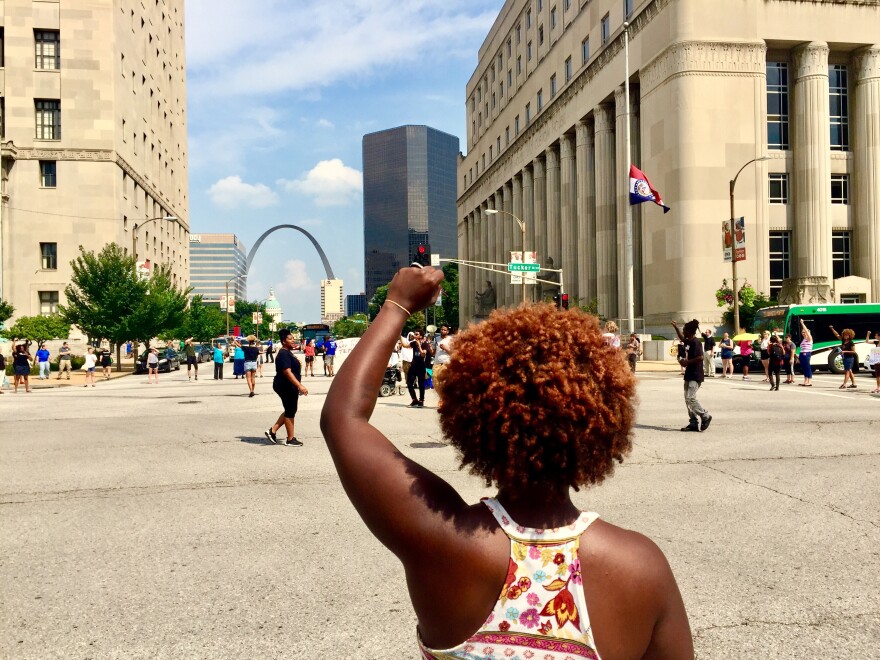This weekend, hundreds of thousands plan to gather for the Women's March on Washington. Expected to be one of the largest demonstrations in American history, the march aims to send President-elect Donald Trump a message on his first day in office: women will not be ignored or disrespected.
More than 3,000 people who can't make it to the national march Saturday plan to join a local march through the streets of downtown St. Louis. While this local march is in solidarity with the national effort, for some participants, it's been hard to find solidarity.
In the weeks leading up to St. Louis' march, white organizers have fielded complaints that they’ve marginalized women of color and transgender women. Although the march aims to unite all women in a fight for their rights under a Trump presidency, many critics have vowed not to participate in an event they say is exclusionary.
White women dominate the planning team behind the march, and most comments on the event’s Facebook page have been posted by white women. At a community meeting held last week at MoKaBe’s Coffeehouse in south St. Louis, most of the women there were white.
Taylor Payne, director of the Yarn Mission and a leader in the black organizing community, expressed frustration over how white organizers of the march appeared to have centered the event on themselves. She joined other women of color in pointing out that the group was skirting tough conversations brought up by that night and online.
“I don’t care if people think that’s divisive, but we need to be talking about race,” Payne said. “I just don’t understand how [this happens] in this day and age, in St. Louis, with the Ferguson uprising having started a movement. There is no excuse as to why there is no inclusion. There is no time for that. We know about this march, [and black women] are not here because these spaces are not always welcoming to us.”
Only one of 12 women planning the march has experience in political organizing. As a person who has been organizing even before the protests that came after a Ferguson police officer killed Michael Brown in 2014, Payne said she found that insulting.
The white women who planned the event acknowledge the oversight.
“[Women of color] weren’t excluded but we were not actively pursuing their voices, and that was a mistake that we made in the beginning,” said Kim Gamel, one of the march’s organizers.
Speakers at the community meeting said women of color are not the only ones who have been left out. Critics also said the march's leaders failed to consider women who have faced police brutality, deportation, poverty and discrimination based on gender identity, age or disability.

“When we hear people say ‘my identity is not represented amongst you’ and that’s not met with [action to] pull people into these spaces and allow space for their voices to be amplified and heard," said De Nichols, an artist and activist who is black, "what is the point?”
Organizers have since issued an apology, thanking those who spoke up about their concerns and promising to be more thoughtful and inclusive in the future. The event's Facebook page has been flooded with conversations about what can be done to better include those who have spoken up about feeling left out.
“When you do something like this for the first time, you might think you’re doing it right, but you’re not,” said lead organizer Valerie Brinkman, who is white. “I had good intentions going in to make this diverse and try to bring everybody together — and I did not realize what a feat that would be.”
Gamel and Brinkman said they also regret trying to guide the message of the march. Now, they encourage participants to march for their unique causes.
“Make this march what you need it to be,” Brinkman said. “If there’s people who chose not to come to the march for whatever reason, I understand that. There have been mistakes that some people can’t look past — but it is about more than just the march. And I will work very hard to prove myself and to prove that this just wasn’t something I wanted to throw together, it will be an ongoing thing."
What that ongoing action might look like, and how more diverse voices will be included is still up in the air. Activist and high school senior Mya Petty said she’s still on the fence on whether she’ll attend the march.
“I’m not seeing a clear direction [from organizers],” Petty said at the MoKaBe's meeting. “I don’t believe in apologies that don’t give me an idea of what you’re going to fix.
“I felt like there were people there who weren’t willing to learn and so it left me really frustrated,” Petty continued. “I feel like there are people who think that Trump is the only issue that women in St. Louis are facing, and that’s why they jumped to action.”
Follow Jenny on Twitter @jnnsmn

